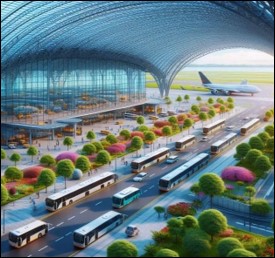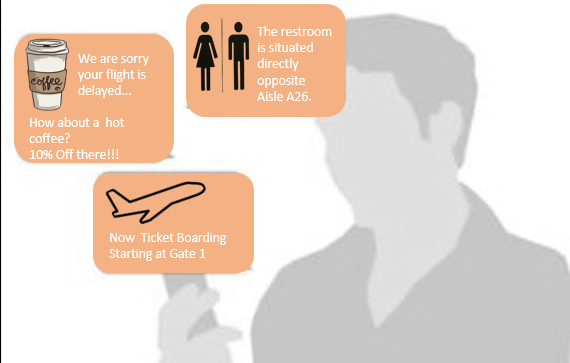Resources-> Blogs -> Smart Airport


In the era of rapid technological advancement, airports are transitioning into “smart airports” by leveraging cutting-edge technologies such as artificial intelligence, the Internet of Things (IoT), and big data analytics. These innovations revolutionize airport operations by enhancing efficiency, safety, and passenger experience. IoT sensors deployed throughout smart airports monitor environmental conditions, equipment status, and passenger flow in real-time, enabling proactive maintenance, optimized resource allocation, and personalized passenger services. From enhancing baggage handling with IoT-enabled tracking systems to bolstering security through smart surveillance and improving energy efficiency with adaptive systems, smart airports exemplify sustainable and innovative practices. By integrating IoT, airports not only streamline operations and enhance security but also prioritize sustainability and deliver seamless travel experiences that meet modern expectations.

IoT sensors are carefully deployed around airports to gather real-time data on a wide range of characteristics. Sensors monitor environmental parameters such as temperature, humidity, and air quality to ensure the best possible conditions for passengers and personnel. Additionally, IoT sensors monitor the movement and state of equipment, like as luggage carts and security systems, allowing for preventative repair and reducing downtime.
Optimising Passenger Flow:IoT technology helps to manage passenger flow, reduce congestion, and improve the travel experience. Smart cameras and sensors mounted at checkin desks, security checks, and boarding gates collect real-time information about passenger lineups. This information is used to dynamically change worker levels and provide extra lanes as needed, resulting in dramatically shorter wait times and increased overall efficiency.
Baggage Handling and Tracking:One of the most fundamental issues in airports is effective luggage management. IoT-enabled baggage tags and conveyor systems provide continuous tracking of luggage from check-in until arrival. Mobile apps allow passengers to obtain real-time updates on the status and location of their baggage, decreasing anxiety and increasing customer satisfaction. For airport operators, this technology reduces the chance of lost or mishandled luggage, resulting in cost savings and increased operating efficiency.
Predictive Maintenance:IoT sensors are used to monitor the health and operation of vital airport infrastructure, including escalators, lifts, and HVAC systems. By analysing data from these sensors, airport maintenance staff can predict when equipment may break and do preventive maintenance. This method avoids unexpected malfunctions, improves safety, and keeps airport infrastructure operating and efficient.
Enhancing Security:Security is the first issue at any airport. IoT technology improves security by enabling real-time surveillance and monitoring. Smart cameras equipped with facial recognition and behaviour analysis algorithms can detect questionable activity and notify security staff promptly. Furthermore, IoT devices monitor access control systems to ensure that only authorised users gain access to restricted locations.
Energy Management and Sustainability:IoT technology improves the sustainability of Smart Airports by optimising energy consumption. Sensors monitor lighting, heating, and cooling systems and modify them in real time based on occupancy and weather conditions. This not only decreases the airport’s carbon footprint, but it also results in significant savings on energy bills.
Passenger Experience and Convenience:For passengers, IoT technology means a more convenient and delightful travel experience. Mobile apps connected to IoT devices provide realtime updates on flight status, gate changes, and baggage claim locations. Smart kiosks and digital signs help people navigate the airport by offering directions and updates. Furthermore, IoT-enabled personalised services like automatic check-ins and tailored retail offers improve customer satisfaction and engagement.
Sustainability:Smart airports frequently feature sustainable practices, such as energy-efficient structures and smart waste management systems, which help to save the environment and lower the airport’s carbon footprint.
ISmart Transport Management is a transformational method to modernising urban mobility that makes use of the Internet of Things (IoT). Cities that integrate IoT technology such as real-time sensors, linked vehicles, and advanced data analytics can reach unprecedented levels of efficiency, safety, and sustainability in their transportation systems. These advances enable dynamic traffic management, predictive infrastructure maintenance, and improved public transport services, which all lead to less congestion, lower emissions, and better commuter experiences. The application of IoT in transportation management also enables better decision-making by continuously collecting and analysing data from multiple sources. This data-driven strategy enables proactive responses to traffic issues, improved route planning, and seamless integration of various forms of transport, resulting in a more integrated and resilient urban mobility ecosystem. Furthermore, the integration of IoT with smart transport management systems creates new opportunities for the development of self-driving vehicles and intelligent transportation networks. These improvements promise to significantly transform how people and things move inside cities, improving overall quality of life and economic output.
Ajeevi Technologies provides innovative and customized solutions in the areas of smart cities, internet of things (IoT), and sustainable development which include:
IoT-enabled Solutions
Ajeevi Technologies has developed IoT-enabled solutions to improve the functioning of cities. Ajeevi offers a range of solutions like smart parking, smart street lighting, smart waste management, and smart water management systems that are connected to the internet and can be monitored and managed remotely.
Sustainable Energy Solutions
Ajeevi Technologies is focused on developing sustainable energy solutions for smart cities and provide solutions that are energy-efficient and rely on renewable energy sources such as solar and wind power.
Data Analytics
Ajeevi Technologies uses data analytics to gather and analyze data to provide insights into the functioning of the city. Ajeevi uses this information to optimize operations, improve service delivery, and make data-driven decisions.
Citizen Engagement
Ajeevi Technologies is committed to citizen engagement and involving citizens in the planning and implementation of smart city solutions. Ajeevi has developed platforms for citizen engagement, including mobile apps, web portals, and social media, which enable citizens to provide feedback, report issues, and participate in decision-making.
Overall, Ajeevi Technologies’ contributions to smart city solutions are aimed at making cities more sustainable, efficient, and citizen-friendly. Our
innovative solutions, focus on sustainability and citizen engagement make them a valuable player in the smart city space. http://www.ajeevi.com

Android Handheld UHF Reader
Automatic Boom Barrier
Automatic Number Plate Reader Camera
Bin Level Sensor
Bio Metrics Machine
Bullet Camera Live
Chlorine Sensor
Data Transmission Unit
Emergency Call Box
Environment Sensor
Face Recognition
Flood Sensor
Fuel Sensor
Galvanized Iron Pole
Gi-Pole
GPS
GPS-AIS140
Handheld HF Reader
Handheld UHF Reader
PTZ Camera
Public Address Speaker
Public Address System
Hydraulic Boom Barrier
IP Bullet Camera
IRIS
Magnetic Sensor
Network Rack
Network Video Recorder
Panic Button
Parking Entry Exit UHF Reader Vehicle Mounted UHF Reader
Passenger information systems
Ph Sensor
Refrigerator Sensor
RFID Tag – HF
RFID Tag – UHF
RFID Tag Metal – UHF
Smart Kiosk
Smart Pole
Soil Sensor
Drainage Sensor
Temperature Sensor
Turbidity Sensor
Ultrasonic Flow Meter Variable Sign Board Weigh Bridge Entry Exit Reader
Thanks for ” Downloading”, “Discovering”, “AJEEVI Products”, hit the submit button requisite information will be in your email box shortly.
Ajeevi Offer “Enterprise IoT Solutions” with in-house R&D, Capability of manufacturing IOT devices.
505, Tower A-1, Corporate Park
Noida 201301, Uttar Pradesh India
presales@ajeevi.com
+91-9654323500